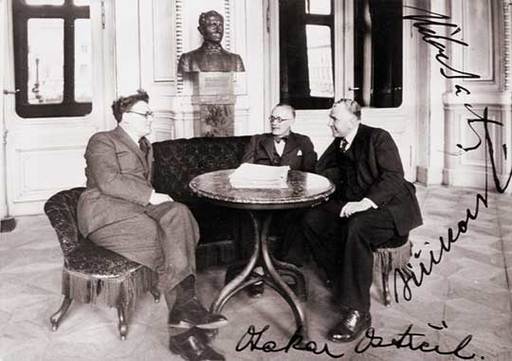He was the theatre director in Brno twice. Mainly the second time is important, when he pulled the Provincial Theatre from difficult years after the economic crisis. Under his leadership, several world premieres were played in Brno, mainly the premieres of the Romeo and Juliet ballet and the opera The Miracles of Mary. His career tragically ended with the occupation of Czechoslovakia and arrest by the Gestapo. On Sunday, 8 May, it will be 125th birthday of the late Václav Jiřikovský.
Václav Jiřikovský is one of the theatre makers who started from scratch. He came from an aristocratic family, but the theatre attracted him already in his young years. At fifteen, he ran away from the Business School in Prague not only to Moravia, but also to a travelling company and became an actor. That was in 1995 and he did not leave the theatre until his death. Before his first "real theatre" engagement, he passed through several companies, he began to direct instead of playing and participated in management. And theatre management – as it would be called today – became his most important field, although he also directed.
As a director, he briefly docked at the Theatre of Associated Cities of Eastern Bohemia and he came to Brno for the first time in 1914. He was hired in the local National Theatre as an actor, but director František Lacina appointed him as the chief director of drama a year later. Jiřikovský – whose real name was Václav František Herain – married Lacina's daughter, became assistant director and was appointed the new director of the theatre in 1917. He left Brno in 1919 after he led the theatre as an independent entrepreneur for a year.
He left for Ostrava, where he founded his own theatre, worked in the Vinohrady Singspiel in Prague and from 1925 he participated in the building of the Slovak National Theatre together with Oskar Nedbal. After mutual disagreements, he returned to Prague for some time, where he tried to start a new undertaking in the former Švanda Theatre in Smíchov and to restore Urania. However, the peak of his theatrical career came with his return to Brno in 1931. He accepted the offer of the Provincial Committee and became the director of the Provincial Theatre. He remained in office until his arrest by the Gestapo in 1941.
He was a particularly adept organiser and theatre director, managing to pull the entrusted theatres from crisis and economic difficulties. This was also shown in Brno, where municipal, provincial and state subsidies did not cover even half of the budget and it was necessary to raise nearly CZK 5 million. In an effort to increase attendance, Jiřikovský reduced subscription prices and introduced discounted performances for students. Visiting opera singers were, on the other hand, a reason to increase ticket prices. The plan to get rid of operetta also showed economically unbearable. Singspiel remained in the Brno theatre just like its director Oldřich Nový.
He welcomed cooperation and supported important artistic personalities, and the Brno opera should not forget his contribution at least in the form of director Miloš Wasserbauer. He himself was mainly a dramatic director, but in opera he staged the today already forgotten work by Zdeněk Fibich Bride of Messina, Fall of Arkun and Hedy. Dramaturgically he focused on Czech and Slavic work, and several major world premieres were played in Brno over his career.
This also included Sergei Prokofiev's ballet Romeo and Juliet, and many operas. Miracles of Mary and Theatre Behind the Gate by Bohuslav Martinů premiered in Brno – the former is coincidentally one of the most successful contemporary productions of the Brno opera. Pieces that are sadly neglected today – Charlatan by Pavel Haas, Marysha by Emil Františk Burian and Flames by Ervín Schulhoff – also had their world premieres in the Provincial Theatre in Brno. Some of the premieres in the Czech territory included The Legend of the Invisible City of Kitezh by Nikolai Rimsky-Korsakov, Khovanshchina by Modest P. Mussorgsky and Lady Macbeth of the Mtsensk District by Dmitri Shostakovich.
The more the occupation of Czechoslovakia was approaching the more provocative the Slavic and patriotic orientation was – Václav Jiřikovský tried to add rousing theatre to the idea of an educational theatre. This ultimately led to his arrest on 3 November 1941. He was held in the Kounice koleje for 6 months and then he was transferred to the Auschwitz concentration camp, where he was murdered. He died on 9 May 1942.
Milan Sachs, Otakar Ostrčil and Václav Jiřikovský. Photo: Archive of the Brno National Theatre































